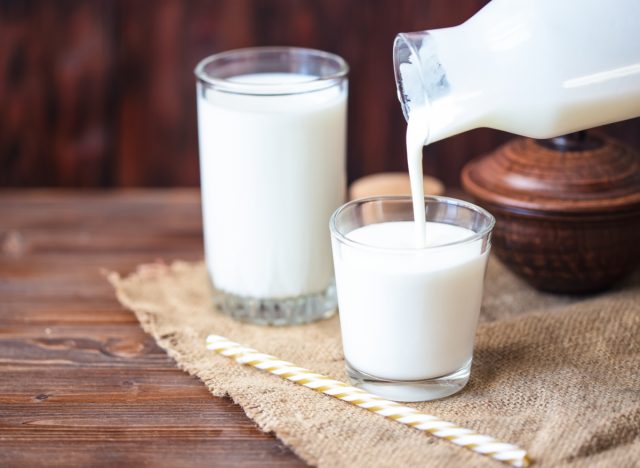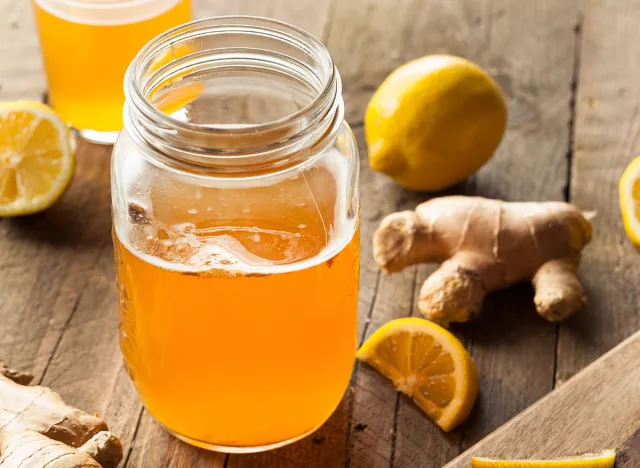Agencies-Gaza post
5 Best Drinks To Improve Gut Health
The balance of bacteria in our gut impacts much more than bloating and bathroom issues. It plays a role in almost every part of us from the function of our immune system and hormone regulation to disease prevention and mental health.
There’s a reason we “go with our gut” when making certain important decisions. We’re relying on the nerves and neurotransmitters along our digestive tract that recognize those feelings of intuition and transmit them to our brain. Officially called the enteric nervous system, this pathway of nerves and neurons communicates directly with their kin in the brain, which is why the gut is often called our “second brain.”
The gut microbiota that resides in the gastrointestinal tract also regulates the innate and adaptive parts of our immune system, so immune cells can battle invading pathogens effectively. But when the homeostasis of the gut microbial community is disrupted, sometimes by an unhealthy diet, dysregulation occurs, which may trigger autoimmune disorders like Crohn’s disease or rheumatoid arthritis.
So, a healthy gut means more than regular bowel movements—although those are important, too. It means the good and bad bacteria making up your microbiota are playing nice—and you’re feeling great. Toast to your continued good health with these microbiota-enhancing beverages.
Kefir

Studies suggest that consuming fermented foods with live cultures can add “good” bacteria to the microbiome. Kefir, a fermented milk beverage with a tangy taste is one of those powerful probiotics that can help bring your microbiome back into balance.
“Fermentation makes kefir easier to digest for those with lactose intolerance because the bacteria and yeast have already broken down carbohydrates, like starch and sugar, in the process,” says registered dietitian Marie Spano, MS, RD, CSSD, lead author of Nutrition for Sport, Exercise and Health.
Fermentation also produces peptides that are unique to kefir. “These easy-to-absorb chains of amino acids may make kefir more ideal for those who have a more difficult time digesting protein. For instance, those with ulcerative colitis, Crohn’s disease, the elderly, and those taking anti-acids may find it easier to digest the proteins in kefir.”
Green Tea

One of the best ways to populate the gut microbiota is to include a wide variety of plant foods and beverages. “Most people don’t think of teas when it comes to variety, but this is a very simple way to incorporate different plant species into your diet,” says registered dietitian Marie Ruggles, MS, RD, CN, author of Optimize Your Immune System.
One of the best teas for gut health (and the most widely researched) is matcha green tea, which contains a high concentration of a potent polyphenol called epigallocatechin gallate (EGCG). Other beneficial teas to mix into your tea rotation include black tea, chamomile, holy basil, turmeric/ginger, and pu-erh, a fermented tea. “The compounds in these teas display pre-biotic activity, interacting with the gut microbiota to produce beneficial bacteria,” says Ruggles.
Tip: Steep longer. A study found that a 5-minute brewing time is associated with greater polyphenol content than 1 minute of brewing.
Some people may be saying: “But I hate the taste of green tea.” Here’s one way to mask the grassy, sometimes bitter, flavor of matcha tea: Mix green tea into a smoothie with banana, almond milk, and vanilla. Or, mix in pineapple to help offset the bitterness of matcha, suggests Spano. “I would add pure pineapple juice and frozen pineapple and blend it.”
Kombucha

Kombucha is a fizzy tea drink made from the fermentation of a symbiotic culture of bacteria and yeast, or SCOBY, and sugar. “We are seeing emerging research on how kombucha may have antimicrobial effects and possibly impact the gut microbiome,” says Amanda Sauceda, RD, who specializes in gut health nutrition.
In a recent review of 15 studies, researchers found that consuming kombucha reduces the imbalance of good and bad bacteria in the intestines and may be beneficial for treating obesity. The results also suggest that the fermented drink lowers oxidative stress and inflammation.
Water

Don’t forget water for good gut health. Keep it top of mind because, if you’re like most people, you don’t drink enough daily. “Water helps to keep things moving through your digestive system and helps with absorbing nutrients from your food,” says Sauceda. It’s also critical because of another important component of a healthy microbiome: fiber.
Dietary fiber is not digested in the small intestine but fermented in the colon and has been shown to modify the microbiota and regulate glucose and blood fat metabolism, leading to better health outcomes, according to a study in Nutrients. But fiber also draws water into the bowel, which can dehydrate you and make you bloated and constipated. “Anytime you eat more fiber, make sure to always drink more water,” says Sauceda. “This is often missed by people.”
Bone Broth

The broth made from simmering the bones and connective tissues of chickens, cattle, and other animals has become a popular health elixir due to its concentration of nutritious vitamins and amino acids like glycine, gelatin, glutamine, and collagen, which support a healthy gut microbiome.
Poor gut health can lead to a condition known as “leaky gut,” which is characterized by a compromised lining of the gut that allows unhealthy substances to leak into your bloodstream, triggering inflammation, according to a review in the journal Gut.
“Collagen helps to nourish the intestinal lining, and gelatin is able to absorb water and help maintain the layer of mucus that keeps gut microbes away from the intestinal lining,” says Samantha Presicci, MCN, RD, LD, a registered dietitian at Fond Bone Broth. “Glutamine may also help with conditions like leaky gut by supporting proper digestion of all the foods you eat—because you aren’t just what you eat—you are what you digest and absorb.”

















